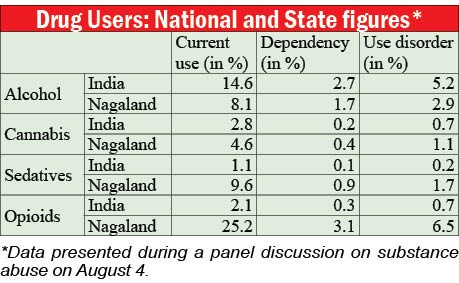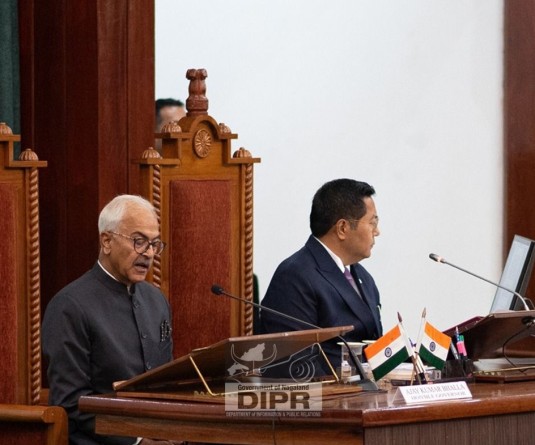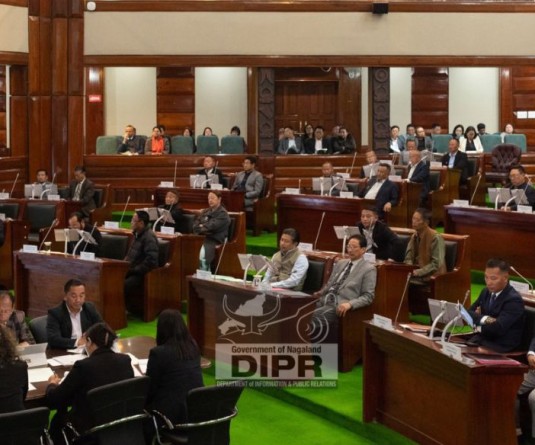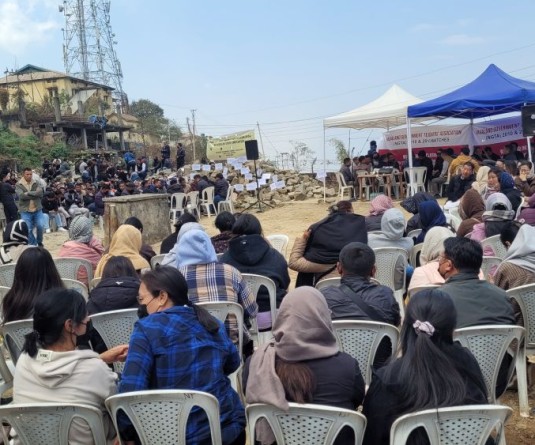
Atono Tsükrü Kense
Kohima | August 4
Despite Nagaland being a small state with sizeable population, the state predominantly has higher rate of substance abuse of various forms than the national average.
Nagaland has 8.1% alcohol users with 1.7% dependency and 2.9% disorders. Though cannabis seems much less talked about, surprisingly, the state has 4.6% users, which is higher than the national average of 2.8%.
Again, the state surpassed the national average of 1.1% sedative users with 9.8% and 25.2% of opioid users with 3.1% dependency and 6.5% disorders, as against the national average of 2.1%. It was informed that 1 in every four person is into opioid use, which is a worrisome factor.
Even in the category of People Who Inject Drugs (PWID) Nagaland including its neighbouring state Manipur found a place in the top ten in the country with a total number of 34000.
This data was shared by Prof Atul Ambekar, MD, NDDTC , AIIMS, New Delhi, chairman of Addictive Disorder Specialty, Indian Psychiatric Society and member of National Consultative Committee on Drug Addiction during the panel discussion on substance abuse with the theme 'better knowledge for better care' through a webinar today.
According to Prof Ambedkar who spoke as one of the panelists, though Nagaland has rich cultural heritage and diversity, it is also faced with multitude of developmental challenges with its people vying attention from the government.
While appreciating the civil society in the state for pioneering towards responding to substance abuse, he pointed out the unique location of the state with international borders which are vulnerable to drug trafficking and consumption as one of the main factor in the high rate of substance abuse.
"Drug use is not a problem but the problem is dependency and disorders" said Prof Ambedkar and made a 4-point recommendation stating that although Nagaland has problems of substance abuse, it also has the solutions to tackle this menace in the society.
Chief Secretary, Temjen Toy in his keynote address conceded that Nagaland had this problem for decades, which is very much alive even today.
Though efforts have been made throughout the years tackling this problem, he regretted that many lives have been lost in the process.
To this end, he asserted "it is our bounden duty to ensure that more lives are not lost and we are able to wipe this problem from the face of Nagaland."
Toy also acknowledged the efforts of civil society, churches, NGOs who have taken on the fight, which according to him has paid very well where both the demand and supply has considerably fallen down.
Nonetheless, he maintained that with changing times, new multi-prong strategies need to be adopted in order to deal with this problem.
He also stressed on the need for FBOs to be more pro-active in dealing with this problem stating "FBOs have a key role to play in this. Apart from scriptures it is important that life skills and realities of today's problems are addressed so that young people are kept within the reasonable limits."
Toy agreed that in the midst of COVID-19 pandemic, the focus of the government has been mainly on controlling and containment of the virus. However, he said "this in a way has also helped us in our addressing the problem of substance abuse." He also claimed that many drug users don't have access to drugs of their choice due to COVID-19 and that many are coming forward for registration for OST. "These are opportunities and advantages we should utilise" Toy said.
The Chief Secretary candidly admitted on the effectiveness of the State Substance Abuse Policy 2016, and emphasised on the need to implement the policy with all the stakeholders to relook at the policy and if required, make necessary amendments.
The other panelists included Wango Langsym, Nodal Officer (Drugs) Social Welfare department, Neichü Mayer, international consultant, Jerusalem, Ketho Angami, Secretary NNaga DAO, Dr Bernice, Joint Director (TI), NSACS, Abou Merry, Regional Director (NE) Kripa Foundation and Centena Aier, Consultant (Therapist) and hosted by Tushimenla Imlong, Consultant, New Delhi.
The panel discussion was organised by Kripa Foundation Nagaland with the objective to identify priorities and recommend effective solutions in the context of substance abuse use in Nagaland.






